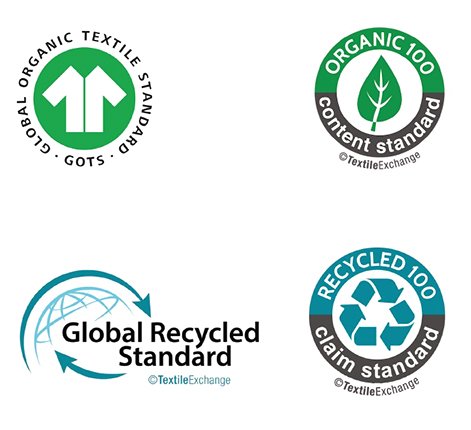Introduction
In the evolving landscape of sustainable fashion, certifications play a pivotal role in ensuring transparency, accountability, and credibility. Among the most recognized certifications are the Recycled Claim Standard (RCS) and the Global Organic Textile Standard (GOTS). These certifications not only help brands demonstrate their commitment to sustainable practices but also provide consumers with the confidence that they are making environmentally conscious choices. This article delves into the significance of RCS and GOTS certifications and their impact on the apparel industry.
What is RCS?
The Recycled Claim Standard (RCS) is an international, voluntary standard that sets requirements for third-party certification of recycled input and chain of custody. The goal of the RCS is to increase the use of recycled materials.
Criteria and Requirements
- Material Composition: Products must contain at least 5% recycled content.
- Chain of Custody: Each stage of production is verified to ensure that the recycled content is accurately identified and tracked from input to the final product.
- Verification: Independent certification bodies conduct audits to verify compliance.
Benefits of RCS Certification
- Consumer Trust: With growing awareness about environmental issues, consumers prefer products with verified recycled content.
- Marketability: RCS certification can enhance brand reputation and open up new market opportunities.
- Environmental Impact: Encourages the use of recycled materials, reducing the need for virgin resources and lowering the overall environmental footprint.
Case Studies
- Patagonia: Known for its commitment to sustainability, Patagonia uses RCS-certified materials in its products, ensuring that they meet high standards of recycled content.
- Adidas: The sportswear giant has integrated RCS-certified recycled polyester into many of its products, aligning with its sustainability goals.
“Certifications like RCS and GOTS are more than just labels; they are benchmarks of quality, sustainability, and ethical production in the apparel industry. They ensure transparency and build trust, making sustainable fashion a reality.”
What is GOTS?
The Global Organic Textile Standard (GOTS) is the leading textile processing standard for organic fibers, including ecological and social criteria, backed up by independent certification of the entire textile supply chain.
Criteria and Requirements
- Organic Fibers: Products must contain a minimum of 70% organic fibers.
- Chemical Restrictions: Prohibits the use of toxic chemicals commonly used in textile processing.
- Social Criteria: Includes strict social criteria, such as safe working conditions, fair wages, and prohibition of child labor.
Benefits of GOTS Certification
- Consumer Confidence: Provides assurance that the product is truly organic and manufactured under strict environmental and social criteria.
- Market Demand: As consumers become more conscious of their purchases, GOTS-certified products are increasingly sought after.
- Sustainability: Promotes sustainable farming practices, reducing the impact on the environment and supporting the well-being of farmers.
Case Studies
- H&M: The global retailer has a significant range of GOTS-certified organic cotton products, demonstrating its commitment to sustainable sourcing.
- Eileen Fisher: This brand uses GOTS-certified fabrics to ensure its products meet high environmental and social standards.
Importance of Certifications in Sustainable Fashion
Transparency and Trust
Certifications like RCS and GOTS provide a framework for transparency, allowing consumers to trust that the products they purchase meet rigorous environmental and social standards. This transparency is critical in an industry often criticized for its opaque supply chains.
Promoting Environmentally Friendly Practices
By adhering to certification standards, brands contribute to reducing the environmental impact of textile production. For example, using recycled fibers can significantly cut down on water and energy usage compared to virgin materials.
Consumer Demand
According to a survey by Nielsen, 73% of global consumers say they would definitely or probably change their consumption habits to reduce their environmental impact. Certifications like RCS and GOTS meet this demand by providing verifiable claims about the sustainability of products.
Impact on Brand Reputation
Brands that obtain and promote these certifications can enhance their reputation and differentiate themselves in a crowded market. This can lead to increased customer loyalty and a stronger competitive edge.
The Certification Process
Steps to Obtain RCS and GOTS Certifications
- Initial Assessment: Determine if the product meets the basic criteria for certification.
- Application: Submit an application to a recognized certification body.
- Audit: Undergo an audit conducted by the certification body to verify compliance with the standards.
- Certification: If the audit is successful, the product receives certification and can be marketed with the certification logo.
Challenges and Tips
- Cost: The certification process can be costly, but the long-term benefits often outweigh the initial investment.
- Complexity: Navigating the certification requirements can be complex. Partnering with experienced consultants can streamline the process.
- Continuous Improvement: Maintaining certification requires ongoing compliance and regular audits, encouraging continuous improvement in sustainability practices.
Conclusion
RCS and GOTS certifications are more than just labels; they are benchmarks of quality, sustainability, and ethical production in the apparel industry. By obtaining these certifications, brands not only meet the growing consumer demand for sustainable products but also contribute to a more transparent and environmentally friendly fashion industry. Sustainable Weave is proud to be a part of this movement, committed to upholding the highest standards in sustainable fashion.
Call to Action
We invite you to learn more about Sustainable Weave’s certified products and our journey towards sustainability. Connect with us on social media and LinkedIn to stay updated with our latest insights and innovations in sustainable fashion. Subscribe to our blog for more informative articles that help you stay ahead in the world of sustainable apparel.
By embracing these certifications, we can collectively drive the industry towards a more sustainable and ethical future. Together, we can make a difference.


